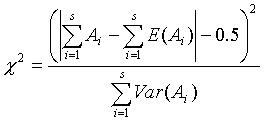
A test for temporal clustering within a single time series or in several time series simultaneously. Currently the software provides two tests for temporal clustering; within a single time series and across all several time series simultaneously.
Data Requirements
Counts of cases over several time periods
Analysis
H0: cases occur at random over the t time periods
Ha: cases do not occur randomly through time
Test Statistic: Define t to be the number of time periods and n to be the number of cases summed over the t time periods. The test statistic, A, is the number of time periods with at least the number of cases expected in the absence of clustering,
![]()
![]()
A can be written as a normal deviate which is expected to be normally distributed with a mean of 0 and unit variance:

A will be small when cases cluster in one or a few time periods. P-values are evaluated by comparing z to the percentiles of the normal distribution.
When analyzing s time series simultaneously an overall p-value is obtained as a Chi square with one degree of freedom:
This allows testing for simultaneous clustering in several time series.
For each time series:
Plot of A against its expectation
Reference
Jacquez, G.M. 1994, User manual for Stat!: Statistical software for the clustering of health events, BioMedware, Ann Arbor, MI.